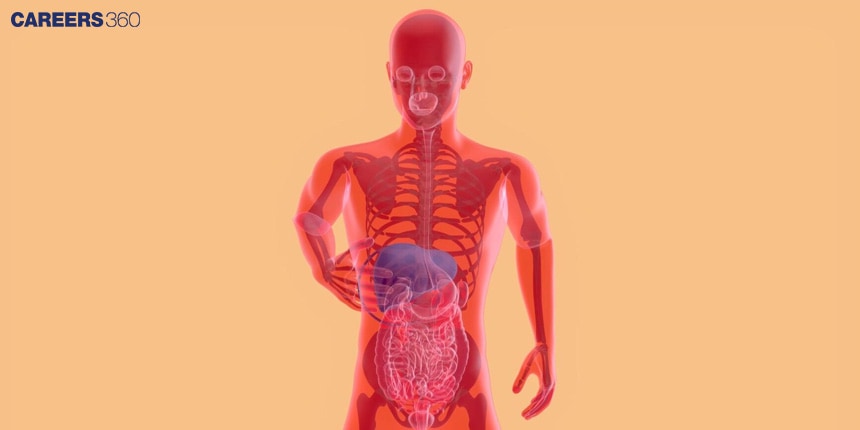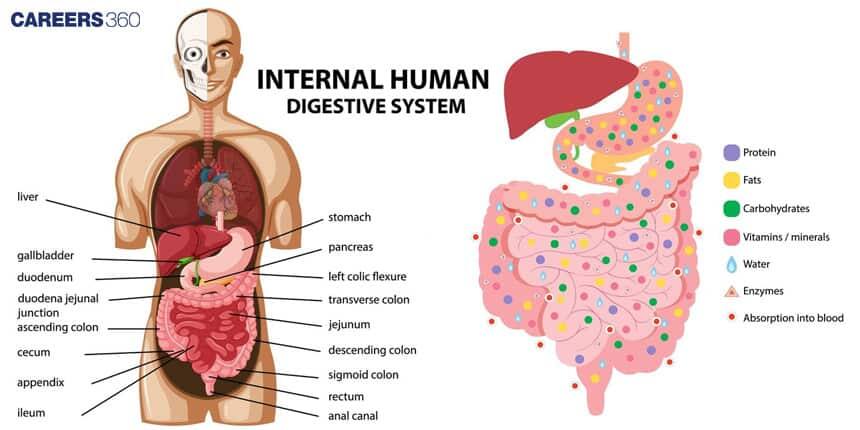Human Digestive System: Definition, Function, Types, Examples
The human digestive system is the process by which food molecules are broken into nutrients that provide energy and sustain the body. Organs include but are not limited to, the mouth, stomach, intestines, and the like, all working together to digest food and absorb the necessary nutrients. A diagram of the digestive system, be it a human or simple digestive system diagram, can help one understand the process. For the students of class 7 and class 10, the digestion system diagram labelled or human alimentary canal diagram makes it easier to understand. This important part of the digestive system in Biology.
Latest: NEET 2024 Paper Analysis and Answer Key
Don't Miss: Most scoring concepts for NEET | NEET papers with solutions
New: NEET Syllabus 2025 for Physics, Chemistry, Biology
NEET Important PYQ & Solutions: Physics | Chemistry | Biology | NEET PYQ's (2015-24)
- What is the Human Digestive System?
- Major Organs
- Accessory Organs
- Stages of Digestion
- Disorders of the Human Digestive System
- Functions of the Human Digestive System

What is the Human Digestive System?
The Human Digestive System is a great mechanism that assumes a critical role in processing the food that each one of us consumes. Imagine enjoying your favourite meal have you ever pondered over what happens to the food once it enters your body? The digestive system just breaks it down into simpler forms like nutrients that power and lead to vital functions in your body.
This has helped me make intelligent choices in terms of food and understand the system within me, as well. The human digestive system transforms the food we consume into energy and building blocks that are vital for growth, repair, and survival.
In this explanation, we will look into the anatomy and physiology of the digestive system, go through the steps of digestion, and clarify the practical importance of everyday life. We would also include along the way visuals like a diagram of the digestive system, an easy diagram of the digestive system, and labelled such as a human alimentary canal diagram. These diagrams are helpful for the process, especially for class 7, class 10, and beyond.
Also Read
Human Digestive System

Major Organs
Mouth: The mouth is the anterior opening of the digestive system. It receives food and breaks it down mechanically and chemically into more manageable substances.
Esophagus: This is a muscular tube that conveys food from the mouth down to the stomach.
Stomach: A sac-like organ that churns up food and mixes it with digestive juices.
Small Intestine: This is a scrollbar-like tube and is the site for most digestion and absorption of nutrients.
Large Intestine: This absorbs water and produces waste products in the form of faeces.
Rectum and Anus: These store and expel faeces.
Accessory Organs
Liver: This manufactures bile for fat digestion.
Pancreas: Secretes digestive enzymes and bicarbonate.
Gallbladder: It stores and concentrates the bile.
These are the major constituents which become the base of the digestive system to hold up the complicated process of digestion.
Digestion is a step-by-step process that finally alters food into absorbable nutrients and waste products.
Stages of Digestion
The stages of digestion are divided into:
Ingestion
The digestion process begins in the mouth. Here, the food is chewed together with saliva. It forms a soft, round mass known as the bolus.
Mixing and Movement
The oesophagus moves the bolus into the stomach by peristalsis, which are wavy muscle contractions. The food, in the stomach, is mixed further with digestive juices that break it down into a semi-fluid substance known as chyme. The stomach, pancreas, liver, and small intestine secrete digestive enzymes, bile, and other juices.
These secretions facilitate the breakdown of food into simple forms that are absorbed easily.
Digestion
The carbohydrates, proteins, and fats in the small intestine undergo enzyme action to break them into smaller molecules such as sugars, amino acids, and fatty acids.
Absorption
The nutrients from digested food get absorbed through the walls of the small intestine to the bloodstream. This enables nutrients to reach other parts of the body for energy and repair.
Excretion
Water is absorbed through the large intestine, and the rest of the waste is compacted into faeces. Waste is propelled out from the rectum and anus
All these processes ensure that food is turned into energy and nutrients and excess waste is removed. Each process is integral to ensuring that our body functions at its best.
The use of aids, such as a basic diagram of a digestive system, including a human alimentary canal diagram or any simple digestive system diagram, can help explain all these stages. This diagram is useful for class 7 students studying biology or class 10 students who learn the human digestive system and how the organs work together to complete digestion.
Disorders of the Human Digestive System
Vomiting: This is the ejection of stomach contents through the mouth.
Diarrhoea: It is an abnormal, watery bowel movement. Continued diarrhoea can result in dehydration
Constipation: It is a situation where faeces remain in the rectum as a result of irregular bowel movements.
Indigestion: A feeling of pain or discomfort in the abdomen due to undigested food and is characterized by fullness. Causes include inadequate secretion of digestive enzymes, poisoning by the consumption of food, nervous anxiety, overeating, and spicy food.
Functions of the Human Digestive System
The human digestive system has two basic functions which are digestion and absorption. The breakdown of food particles into minute nutrients that support the supply of energy, cell repair, and growth forms digestion. The nutrient and liquid intake are broken down into carbohydrates, vitamins, fats, and protein molecules, which the blood then absorbs and carries to distant cells in the body.
The human digestive system, also known as the alimentary canal, carries out this activity. There are various parts of it such as the mouth, oesophagus, stomach, small intestine, and large intestine, each performing a special duty in the digestion process.
Also Read
Recommended Video on the Human Digestive System
Frequently Asked Questions (FAQs)
The major role of the human digestive system is to digest food into smaller molecules which can easily be absorbed and used by the human body for energy, development, and repair.
The digestion process usually varies from 24 to 72 hours depending on the nature of the food consumed and individual digestive health.
Common digestive disorders are gastroesophageal reflux disease, irritable bowel syndrome, Crohn's disease, and finally, constipation.
Fibre bulks the stool so that it can pass through easily and also increases the frequency of bowel movements. It's also a food source for gut bacteria that have good health effects.
Yes, stress may influence digestion very badly. Stomach pains, bloating, and alteration in bowel activity are some short-term symptoms which may affect the stomach due to stress. Keeping healthy digestion will help in maintaining the striving control over stress.